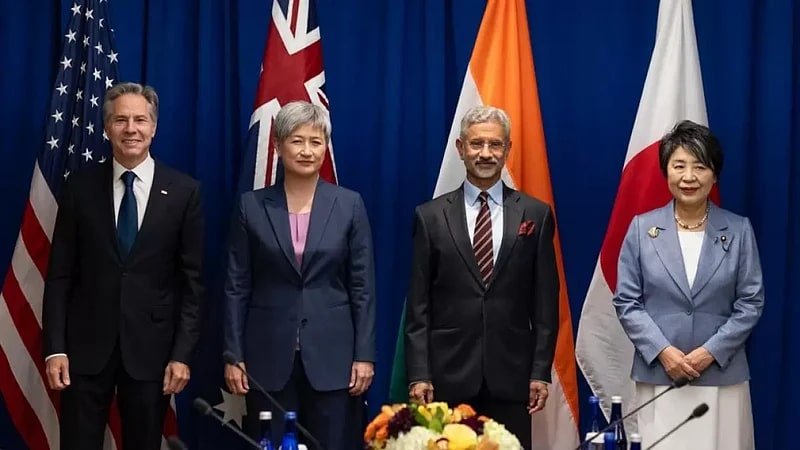As the strategic landscape in the Indo-Pacific continues to evolve, the Quadrilateral Security Dialogue (QUAD) — comprising the United States, India, Japan, and Australia — has increasingly positioned itself as a force for regional stability and democratic coordination. From supply chain resilience to maritime security, the alliance has made strides toward institutional coherence. However, when it comes to counter-terrorism, cracks in consensus remain apparent, particularly in the attribution of state-linked terrorism.
The recent Quad joint communiqué following the June 2025 leadership summit in Tokyo reiterated the grouping’s shared commitment to “combating all forms of terrorism,” condemning attacks on civilians and calling for adherence to UN Security Council Resolution 1373. Yet this joint statement lacked the names of any specific perpetrators, state sponsors, or ongoing regional flashpoints—including the Operation Sindoor fallout in Kashmir, which India had hoped would draw greater diplomatic support from its partners.
This deliberate ambiguity raises critical questions:
- Is the Quad’s counter-terrorism unit limited to general principles, or does it falter when collective condemnation risks impinging on bilateral strategic interests?
- What does this signal about the evolving purpose — and limits — of the Quad as a security framework?
The Joint Statement: A Carefully Calibrated Consensus
In tone and content, the Quad’s 2025 statement reflected the alliance’s typical balancing act. It reaffirmed the need to counter terrorism “in all its forms and manifestations” and demanded the prosecution of perpetrators, facilitators, and financiers. Yet it avoided naming any specific attack or actor, despite India’s strong push for reference to the Pahalgam attack and its broader campaign against cross-border terrorism.
Privately, Indian officials expressed disappointment over the omission, especially given that the Pahalgam incident — which killed 26 tourists — had received strong bilateral condemnation from Washington and Canberra.
The lack of collective attribution within the Quad underlined a persistent tension and challenges in national reconciliation efforts in the backdrop of the alliance’s geopolitical caution.
Divergent Threat Priorities Among Quad Members
While India places terrorism — particularly emanating from Pakistan and Afghanistan — at the centre of its national security agenda, other Quad members adopt a broader, often less sensationalist and regionally focused approach.
The United States, though sympathetic to India’s concerns, continues to prioritise countering China’s regional assertiveness, cybersecurity threats, and maritime freedom. While U.S. officials often condemn terrorism, direct alignment with India’s attribution of Pakistan-linked groups could complicate Washington’s attempts to maintain backchannel ties with Islamabad for Afghan stability.
- Japan and Australia, both increasingly vocal on regional security issues, tend to view terrorism through a global lens, often focused on transnational threats, ISIS resurgence, or domestic radicalisation. For Tokyo and Canberra, entangling the Quad in India-Pakistan disputes risks undermining the Quad’s cohesion and distracting from the primary goal of a free and open Indo-Pacific.
- This divergence has resulted in a Quad counter-terrorism posture that is normative but non-confrontational, offering unity in language but hesitance in attributive clarity.
A Familiar Pattern: Solidarity without Specificity
The ambiguity in the Quad’s terrorism language is not new. In the aftermath of the Pulwama-Balakot crisis in 2019, and again after the Galwan Valley clash in 2020, joint statements avoided naming specific countries or actors, opting instead for broad principles. This has allowed Quad members to project unity without risking bilateral entanglements.
Yet critics argue that this non-committal posture weakens deterrence and leaves member states, particularly India, exposed in their regional disputes. By refusing to jointly name entities like Lashkar-e-Taiba or Jaish-e-Mohammed, which are UN-listed terrorist groups, the Quad risks appearing hesitant on issues it claims to oppose unequivocally.
This becomes particularly salient in the post-Sindoor environment, where India has sought to frame its actions in Kashmir as a response to cross-border terrorism. Without explicit support, Indian analysts increasingly question the strategic value of the Quad in India’s immediate security calculus, even as cooperation in other domains — tech, defence, climate — continues to expand.
Strategic Caution or Structural Limitation?
One interpretation of the Quad’s reluctance to offer attribution is strategic prudence. By avoiding divisive regional disputes, the grouping can maintain consensus and focus on areas of broad convergence: Indo-Pacific deterrence, maritime security, and technological resilience.
However, another view suggests a deeper structural limitation: the Quad may be too heterogeneous in geography, interests, and threat perceptions to function as a coherent counter-terrorism alliance. Unlike NATO or even the SCO, which have formal mechanisms and geographic cohesion, the Quad remains non-binding and informal, driven more by political signalling than operational synergy.
Pakistan’s Position: Watching Closely
Though not a Quad stakeholder, Pakistan remains a key variable in this equation. Islamabad has consistently viewed India’s efforts to internationalise its terrorism claims as a form of strategic deflection, particularly in forums like the Quad, where Pakistan has no voice. The Quad’s refusal to echo Indian narratives strengthens Pakistan’s belief that India’s diplomatic leverage — even among partners — has limits when it comes to Kashmir.
Moreover, the United States’ balancing act — condemning terrorism but avoiding direct confrontation with Pakistan — offers Islamabad a degree of strategic comfort. For Pakistan, the Quad’s equivocation is not just a diplomatic win; it reinforces its view that multilateral platforms are unlikely to back India in unilateral escalations.
Unity in Principles, Divergence in Practice
The Quad’s counter-terrorism consensus reveals the strengths and shortcomings of the alliance. While the four members remain united in their rejection of terrorism and commitment to stability, their reluctance to engage in specific attribution reveals the fragility of strategic alignment on sensitive regional issues.
For India, this reality underscores the limitations of multilateralism in addressing bilateral insecurities. For the Quad, it highlights the need for careful calibration — walking the line between principled condemnation and strategic neutrality. Whether this ambiguity is a strength that preserves unity or a weakness that limits efficacy remains a defining question as the alliance matures.
QUAD’s Strategic Nuance: No Endorsement of Indian Propaganda



























